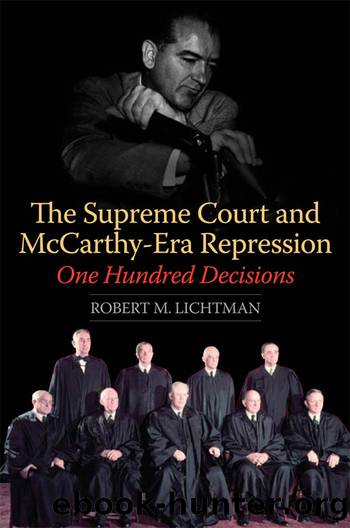The Supreme Court and McCarthy-Era Repression by Robert M. Lichtman

Author:Robert M. Lichtman [Lichtman, Robert M.]
Language: eng
Format: epub
Tags: History, General, United States, 20th Century, Political Science, Political Ideologies, Communism; Post-Communism & Socialism, History & Theory
ISBN: 9780252094125
Google: UcrzPVAVb1MC
Publisher: University of Illinois Press
Published: 2012-08-15T16:03:00+00:00
More Contempt CasesâWilkinson, Braden, et al.
Committee-contempt cases flooded the Court. It issued five signed decisions in contempt cases, two involving successive witnesses at the same HUAC hearing in Atlanta.6
Frank Wilkinson, a forty-three-year-old political activist from California who had been an âunfriendlyâ witness at earlier HUAC hearings, came to Atlanta as the representative of a group advocating HUACâs abolition. Arriving at his hotel, he was served with a HUAC subpoena ordering him to appear as a witness. At the hearing, Wilkinson declined to answer questions, invoking the First Amendment, and was indicted for contempt for refusing to answer the question, âAre you now a member of the Communist Party?â He argued that he was not subpoenaed for a valid legislative purpose but rather to expose him to public censure because of his anti-HUAC activities.7
The Courtâs usual five-justice majority, in an opinion by Stewart, affirmed Wilkinsonâs conviction and one-year prison sentence. As to his claim that he was subpoenaed for advocating HUACâs abolition, the Court found ânothing to indicate that it was the intent of Congress to immunize from interrogation all those (and there are many) who are opposed to the existence of [HUAC].â âMoreover,â it said, âit is not for us to speculate as to the motivations that may have prompted the decision of individual members of the subcommittee to summon [Wilkinson].â Rejecting Wilkinsonâs First Amendment contentions as having been âthroughly canvassed by us in Barenblatt,â the Court stated that âit is the nature of the Communist activities involved . . . that establishes the Governmentâs overbalancing interest.â8
Blackâs dissent, joined by Warren and Douglas, argued that the case âinvolves nothing more nor less than an attempt by [HUAC] to use the contempt power of the House of Representatives as a weapon against those who dare to criticize it.â Turning again to Barenblattâs balancing test, he said that where First Amendment freedoms âare left to depend upon a balance to be struck by this Court in each particular case, liberty cannot survive. For under such a rule, there are no constitutional rights that cannot be âbalancedâ away.â Brennan wrote that HUACâs âdominant purposeâ was to harass Wilkinson and âexpose him for the sake of exposure.9
Carl Braden preceded Wilkinson to the witness stand at HUACâs hearing. Several years earlier, Braden, then a copyeditor at the Louisville Courier-Journal, and his wife Anne, both pro-integration activists, were nominal purchasers of a home in a whites-only neighborhood, which they then conveyed to a black family. After the home was destroyed by dynamite, the Bradens were made defendants in a Kentucky sedition caseâprosecutors charged the bombing was a Communist plot intended to aggravate racial tensions. Carl was convicted and received a fifteen-year prison sentenceâset aside, however, following the Courtâs Nelson decision.10
Prior to the hearing, Braden helped circulate petitions in opposition to state sedition laws and to HUACâs hearing. Summoned as a witness, he refused to answer six questions concerning his political associationsâone asked whether he was a CPUSA member when he signed a letter urging opposition to bills in Congress to overrule Nelsonâand was convicted of contempt.
Download
This site does not store any files on its server. We only index and link to content provided by other sites. Please contact the content providers to delete copyright contents if any and email us, we'll remove relevant links or contents immediately.
The Burglary by Betty Medsger(629)
Narrative of the Life of Frederick Douglass, an American Slave Incidents in the Life of a Slave Girl by Harriet Jacobs Frederick Douglass(515)
With Liberty and Justice for Some by Glenn Greenwald(484)
Policing the Planet: Why the Policing Crisis Led to Black Lives Matter by Jordan T. Camp(470)
Free Speech: A Very Short Introduction (Very Short Introductions) by Warburton Nigel(398)
Tribes and Tribulations by Unknown(363)
Emotional Intelligence: The Most Complete Blueprint to Develop And Boost Your EQ. Improve Your Social Skills, Emotional Agility and Discover Why it Can Matter More Than IQ. (EQ Mastery 2.0) by Glenn Cummings(338)
Open Season by Ben Crump(336)
Why Marriage Matters by Evan Wolfson(335)
When Islam Is Not a Religion by Asma T. Uddin(329)
Freedom Riders by Arsenault Raymond;(329)
Brokered Subjects by Elizabeth Bernstein(317)
Handbook for a Post-Roe America by Robin Marty(289)
Race and Restoration by Barclay Key(264)
Networked Press Freedom by Ananny Mike;(256)
Abigail Scott Duniway and Susan B. Anthony in Oregon by Jennifer Chambers(246)
Anatomy of Innocence by Laura Caldwell(245)
What's Wrong with Rights? by Radha D'Souza(183)
National Law and International Human Rights Law by Onkemetse Tshosa(177)
